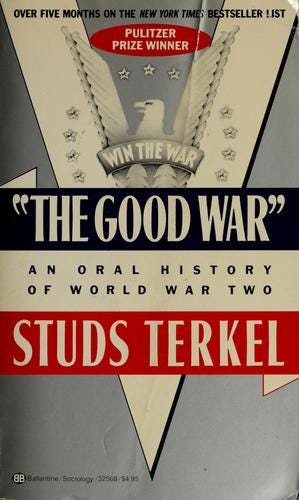I read the masterful Japan at War: An Oral History a few years ago, and picked up a copy of Studs Turkel’s The Good War hoping for more of the same: a deeply moving, perspective shifting account of one of the most important conflicts in history.
Perhaps unsurprisingly, it did not live up to those standards. It has moments of depth, but The Good War is An Okay Book, because of my familiarity with the subject, problems of framing, and lack of editorial restraint.
Familiarity?
Yep. Most Americans have a pretty set vision of WW2: we came in, kicked Nazi ass with a little help from the Russians, then came home wealthy and righteous. The Good War doesn’t do much to challenge that narrative. In fact, it’s got a problem: many of the people in the stories don’t tell their stories–they tell the nation’s story. There’s a lot of editorializing about how the war lifted the country out of the depression, how gung-ho Americans were about beating the Nazis, and how everyone thought it was odd how quickly we turned on the Russians. But these generic narratives aren’t any more interesting than a short paragraph in a history textbook, and they’re not terribly informative.
Even when the stories get personal, they’re pretty stock narratives: a German girl faces deprivation in a bombed out city. A Japanese citizen is interred in a camp. They’re tales that an American has heard thousands of times before, and they don’t do much to illuminate the conflict beyond one’s preconceived notions.
How does that relate to the framing problem?
The strength of an oral history is that it can put you in a moment in time in a way that conventional histories can’t. It can show you very precisely what it was like to be a GI, or a prisoner of war, or a factory worker at home. Good oral histories involve people telling their stories in great detail: baring their hearts about their sufferings and triumphs.
The Good War does a poor job of this. Most of the stories are short, only a page or two, and they suffer from the summarizing and editorializing described above. Occasionally, someone will tell a brief narrative, but they’ve got the feel of anecdotes that have been told hundreds of times–they’ve lost their emotional heft. There’s a sense of superficiality that works against the greatest strength of the genre, and leaves the reader dissatisfied. You don’t get someone’s life story in The Good War, you get short excerpts they’ve told many times before.
Of course, it’s when The Good War digs deep into someone’s experience that it succeeds the most. One woman describes being a teenage girl reveling in attention from new soldiers. Her enthusiasm leads her to write love letters to dozens of men overseas–all at once. It all climaxes when one of the men she wrote to comes by to propose to her, and she tells him she never much cared about him…and she’s only sixteen. Stories like these, when they appear, bring the reader into someone’s world, and it’s a shame that they are a rarity in the book.
You mentioned editorial failings?
There are so many generic “home front’ stories in this book. It felt like half of the 600 page book was people telling the same story: “We were poor. Then the war came, and everyone had money. Everyone came together, and a rising tide lifted all boats. Then, soldiers came home and everyone wanted to forget. Nowadays, it feels like we lost the innocence of that time.”
This story comes up over, and over, and over again, and it’s not particularly interesting. It suffers from the vagueness problem discussed above, and it just feels like a waste of time. I think a key aspect of these oral histories is to prune out redundant stories and dig deep into the exceptional ones, and The Good War fails on both of those counts.
Is there an overall theme to the book?
Weirdly, the theme seems to be “WW2 was the last time America was good.” The book came out in the 1980s and suffers from the cynicism of the time. It makes sense–Vietnam was fresh in people’s minds, and the country had been through several decades of turmoil. But it colors the narratives: people often mention the shallowness (and effectiveness) of war propaganda, and the use of the atomic bomb on Japan is painted in quite negative tones. There’s an anti-war, anti-government streak that runs through the book (Vietnam and Korea come up a lot), and it makes something that ought to be a historical document feel very much like a product of its time.
That being said, there’s some interesting stories that come out of that perspective. Terkel interviews a handful of black soldiers, and their stories of discrimination, and their ability to rise above it, are highlights. One soldier describes how, on a segregated base, several black soldiers were murdered by a group of whites for no reason. And theres an interview with a member of the 761st Tank Battalion, a distinguished all-black group of tankers, that provides a jolt of energy to a slow book. There’s also some interesting ruminations by GIs that had met Russian soldiers. Their lingering goodwill towards the Russians reminds the reader that not everyone in the 1950s was rabidly anti-communist.
Does The Good War pass the Bechdel test?
Surprisingly, yes, given that the author is a man. There’s a conversation with two women who survived Hiroshima.
Would you recommend The Good War?
Only to someone who’s fanatical about WW2. Others should read the superb Japan at War: An Oral History first, which tackles the same project from the Japanese perspective, and provides a deep, moving look into the war.



